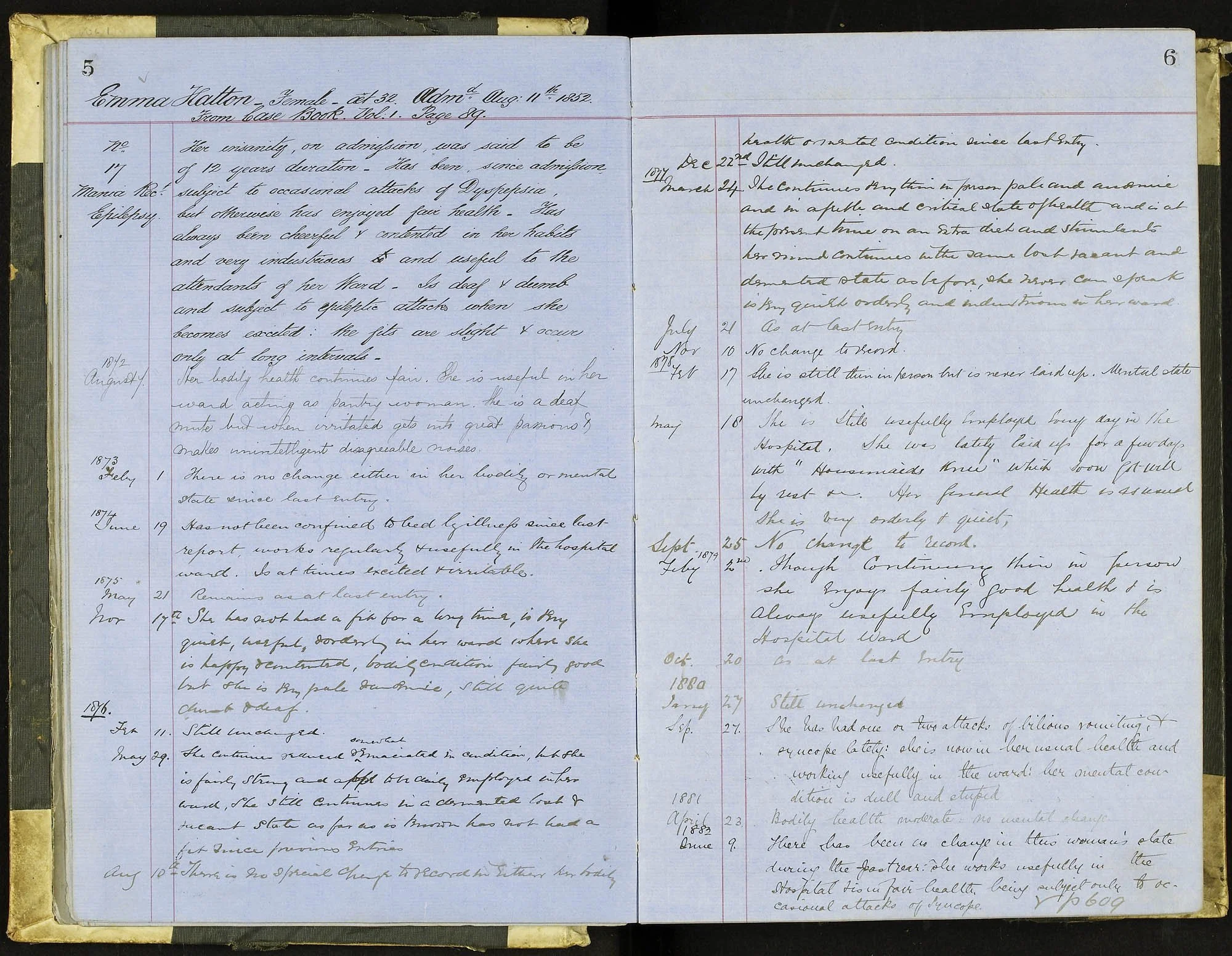OUTSIDE THE ASYLUM
Can you help George Marshall Medical Museum with a spot of family history research to find out about some people who were admitted to the Worcester City and County Lunatic Asylum in the 19th century?
Our aim is to share more patients’ stories, and to find out about their lives before admission and (where possible) after discharge.
emma hatton
find out more about emma hatton
Powick Lunatic Asylum opened in 1852 and some of it’s first patients were pauper inmates from other private asylums. One such asylum was Droitwich. This housed around 100 patients two thirds of which were pauper patients who were charges to the local union, the remaining third were private patients who could afford to pay for their treatment. The living conditions for the two groups were often very different.
The visitors book of the Droitwich asylum for 5 July 1852 records that 63 pauper patients were due to be transferred from there to the new County Lunatic Asylum at Powick and that Droitwich would just house private patients. A later entry dated 13 September 1852 shows that since the last visit of the Visitors all the pauper patients have been removed to Powick with the exception of one male who had died and two males who had recovered. This left Droitwich with just 31 private patients.
One of the patients who moved to Powick is Emma Hatton. Her admission records for Droitwich give only a few details, she is from Ombersley and was admitted to Droitwich on 31 Aug 1845 having been certified by W.R. Jacques (surgeon) and authorised by the overseer and officiating clergyman. She is transferred to Powick on 11 Aug 1852. Unfortunately, trying to find out about Emma’s life before entering the Droitwich Asylum has not been possible as there is very limited information on her admission records. There are no relatives listed, no address or even a date of birth, without these identifying the correct person is very difficult.
The inmates now found themselves in vastly improved living conditions in the new buildings that made up the Powick Asylum. The July 1852 Visitors records for Droitwich provide a vivid description of the conditions Emma had left behind.
“The various rooms were now free from unpleasant odour but several of the floors were damp and the flooring in some of them is quite rotten. Indeed the whole premises are in a very dilapidated condition. We refrain from making any suggestion for their improvement.”
Emma’s records show that on admission her condition of mania with epilepsy had been of 12 years duration, but apart from the occasional bout of dyspepsia she enjoys good health. She is always cheerful and contented, industrious and useful to the attendants on her ward. But hidden away within the notes is that she is deaf and dumb, making unintelligent and disagreeable noises.
Her case notes for 1872, twenty years after her admission show that very little has changed in her condition. Her epileptic fits usually said to be caused when she gets over excited, have been few with long intervals between their occurrence. Her job within the asylum is to act as pantry woman for her ward. Entries for 1877 show that she is now pale and anaemic and because of this she is on an extra diet. Sadly her mental state is described as being lost, vacant and demented, a condition she can never escape. Later that year she is laid up for a few days with “Housemaid’s Knee”. She is still usefully employed on the ward.
A further ten years on and Emma’s health is deteriorating. Her belly is very distended, her tongue is furred and she has ascites (a build-up of fluid in the abdomen). Throughout April her condition worsens and includes periods of jaundice. The entry for April 12th 1887 reads “gradually sank and died today”. Her cause of death is given as cancer of the liver. She was 67 years old and had spent over 42 years in an asylum, 7 at Droitwich and 35 at Powick. She was buried in the cemetery at Powick.
Research by Nicola Hewitt, 2025.
To view Emma’s patient records, click here.
Go back to find out about more people who were patients at the asylum.
